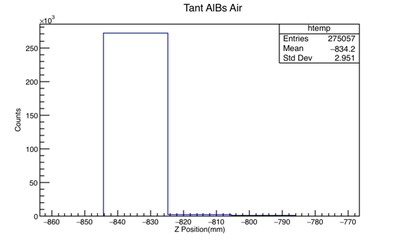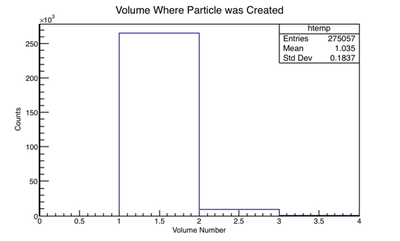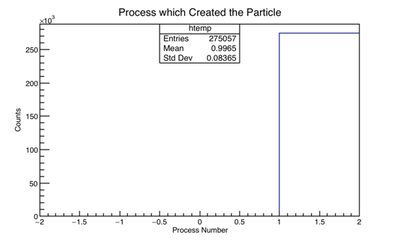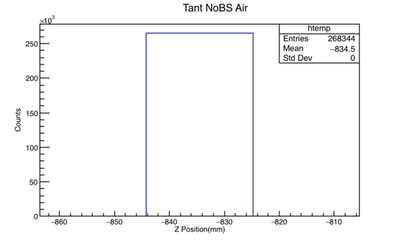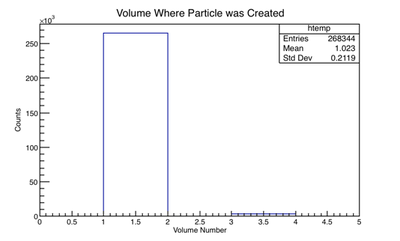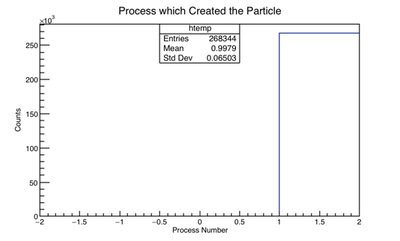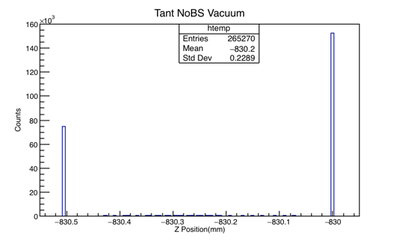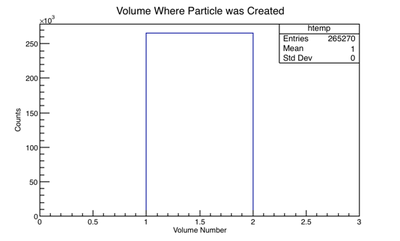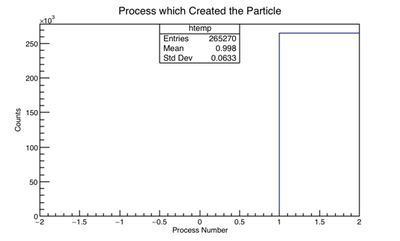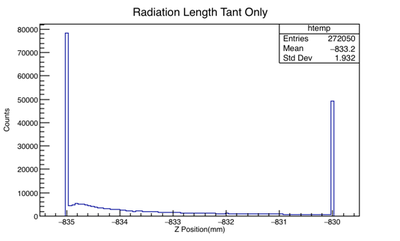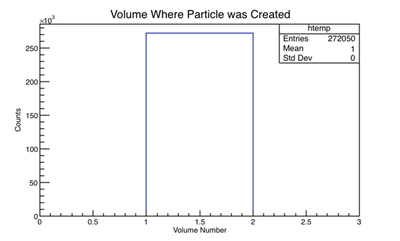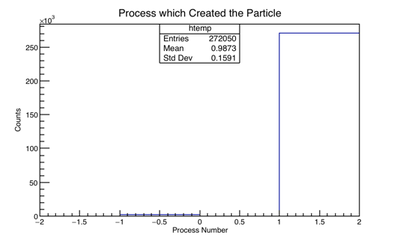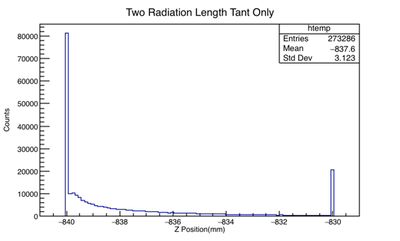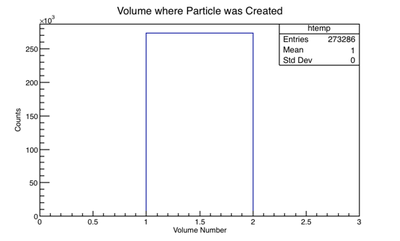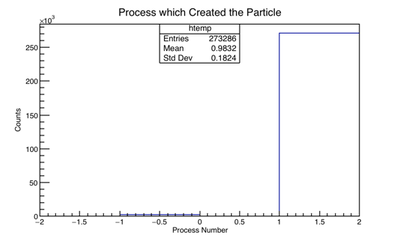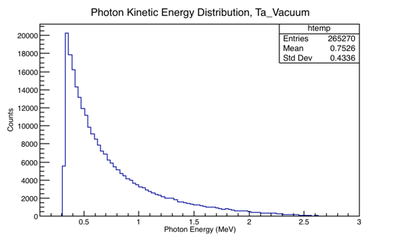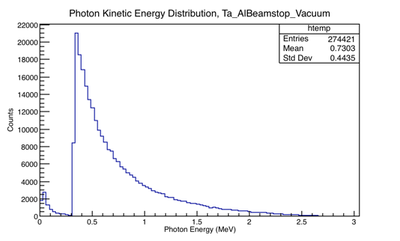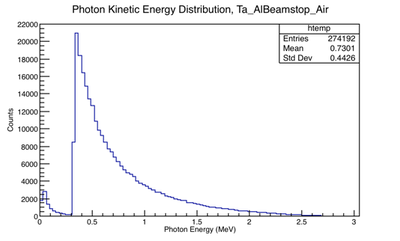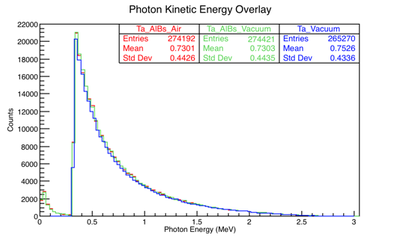Photon Creation Simulations
Tantalum, Aluminum Beamstop, and Air
Simulation Parameters
Target Matter: Tantalum
Target Length: 0.0508cm
Beamstop Matter: Aluminum
Beamstop Thickness: 1.27cm
Chamber Matter: Air
Tracker Matter: Air
World Matter: Vacuum
Target physically starts at -84.4cm and ends at -84.3492cm
Beamstop starts at -84.3492cm and ends at -83.0792cm
The tracker starts at -83.0792cm and ends at -3.0792cm
Conclusion
The beamstop is not thick enough to prevent electrons from traveling through the Tantalum to brem off of the air in the tracker.
Tantalum, No Beamstop, and Air
Simulation Parameters
Target Matter: Tantalum
Target Length: 0.0508cm
Beamstop Matter: Vacuum
Beamstop Thickness: 1.27cm
Chamber Matter: Air
Tracker Matter: Air
World Matter: Vacuum
Target physically starts at -84.4cm and ends at -84.3492cm
Beamstop starts at -84.3492cm and ends at -83.0792cm
The tracker starts at -83.0792cm and ends at -3.0792cm
Conclusion
Majority of photons are being created in the Tantalum target with some electrons traveling through the Tantalum to brem in the tracker.
Tantalum, No Beamstop, and Vacuum in every volume but target
Simulation Parameters
Target Matter: Tantalum
Target Length: 0.0508cm
Beamstop Matter: Vacuum
Beamstop Thickness: 1.27cm
Chamber Matter: Vacuum
Tracker Matter: Vacuum
World Matter: Vacuum
Target physically starts at -83.0508cm and ends at -83.0cm
Beamstop starts at -83cm and ends at -81.73cm
The tracker starts at -81.73cm and ends at -1.73cm
Conclusion
All of the photons are being created inside the tantalum, electrons are definitely making it though the tantalum.
In this simulation, I commented out the beamstop instead of setting the matter to vacuum, which explains why the position is shifted by roughly 1cm from the 2 simulations above this one.
Tantalum with thickness just over 1 radiation length
Simulation Parameters
Target Matter: Tantalum
Target Length: 0.500 cm
Beamstop Matter: Vacuum
Beamstop Thickness: 1.27cm
Chamber Matter: Vacuum
Tracker Matter: Vacuum
World Matter: Vacuum
Target physically starts at -83.5cm and ends at -83.0cm
Beamstop starts at -83.0cm and ends at -81.73cm
The tracker starts at -81.73cm and ends at -1.73cm
Conclusion
All of the photons are being created inside the tantalum.
Tantalum with thickness just over 2 radiation lengths
Simulation Parameters
Target Matter: Tantalum
Target Length: 1.000 cm
Beamstop Matter: Vacuum
Beamstop Thickness: 1.27cm
Chamber Matter: Vacuum
Tracker Matter: Vacuum
World Matter: Vacuum
Target physically starts at -83.5cm and ends at -83.0cm
Beamstop starts at -83.0cm and ends at -81.73cm
The tracker starts at -81.73cm and ends at -1.73cm
Conclusion
All of the photons are being created inside the tantalum.
Tantalum with thickness of 2.5cm
Simulation Parameters
See images for differing physics between the simulations.
Target Matter: Tantalum
Target Length: 2.5 cm
Beamstop Matter: Vacuum
Beamstop Thickness: 1.27cm
Chamber Matter: Vacuum
Tracker Matter: Vacuum
World Matter: Vacuum
Conclusion
In the Brem & Ionization simulation the majority of the photon creation happens at the end face of the Tantalum. There is a spike at the first face of the target and also a bit of grass in between, this leads me to believe that the particle tracking in the simulation isn't working correctly, or is counting every interaction of every photon, which would explain why there is a huge spike of counts at the end face of the target.
In the Ionization simulation, there were no photons created.
Tantalum with thickness of 0.0508cm (20 thousandths of an inch)
Simulation Parameters
| Figure # | Target Matter | Beamstop Matter | Tracker Matter | Chamber Matter |
| Figure 1 | Tantalum, Z = 73 | Vacuum | Vacuum | Vacuum |
| Figure 2 | Tantalum, Z = 73 | Aluminum Z = 13 | Vacuum | Vacuum |
| Figure 3 | Tantalum, Z = 73 | Aluminum Z = 13 | Air° | Air° |
°Air = 70% Nitrogen (Z = 7), 30% Oxygen (Z = 8), density = 1.29 mg/(cm^3)
Conclusion
